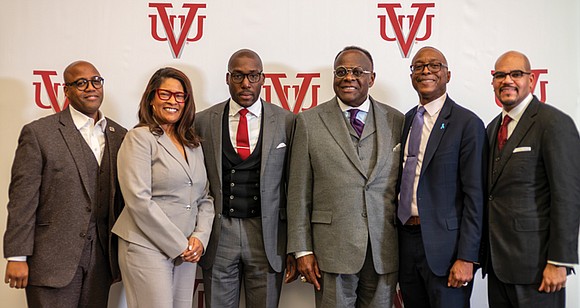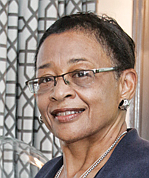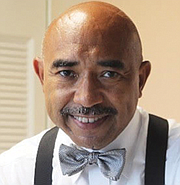Community rallies to preserve historic Black hospital
George Copeland Jr. | 2/29/2024, 6 p.m.

Richmonders will rally for an important symbol of the city’s Black history Sunday afternoon at the former Richmond Community Hospital on Overbrook Road.
Virginia Union University, a historically Black university which owns the former hospital, plans to demolish the historic building and replace it with housing.
Sunday’s rally is being organized by former Virginia Delegate and Secretary of Administration Viola Baskerville. Testimonies are expected to come from residents whose lives and histories were impacted by the hospital, first established in 1907 under the vision of Dr. Sarah Garland Jones, the first Black woman licensed to practice medicine in Virginia.
The Overbrook Road hospital was built in 1932 to mainly treat Black patients who faced medical discrimination. The hospital moved again in 1980 to its current location at 1500 N. 28th St. with personal financial investment from 21 doctors. That hospital is now owned by Bon Secours.
The rally is just one of many reactions to emerge after Virginia Union University announced its decision during a news conference earlier this month to partner with the Steinbridge Group to build up to 200 general-use residences in a 2-acre area across from the VUU campus’ northern side.
The hospital’s demolition is part of a $42 million housing project created through a partnership between VUU and the New York-based company The Steinbridge Group. Numerous VUU and city officials who attended the gathering at the university’s Living and Learning Center greeted the announcement with hearty applause.
The project is part of Steinbridge’s efforts to help historically black colleges and universities, and other minority-focused groups, transform underused resources into economic assets.
However, Ms. Baskerville and others who oppose the demolition, believe that VUU and other HBCUs should not have to destroy the history of a community to attain economic success.
The rally, she said, is “a way to hopefully inform the president of Virginia Union, the Board of Directors of the community of the Virginia Union, and of course the developer ...of the significance of this site,” Ms. Baskerville said.
In a statement announcing the project on Feb. 2, VUU President and CEO Hakim J. Lucas said:
“Virginia Union is going places we have never been before, statewide and nationally, because students and the community have high expectations of this institution.
“The Steinbridge investment will enable Virginia Union to create new sources of income, which will further strengthen our ability to create opportunities for students and the community.”
Ms. Baskerville believes it’s possible and necessary to include the hospital in VUU’s plans for the area, and pointed to adaptive reuse of the building and its components as a way to allow it to stand and be part of the housing project.
Timothy Roberts is an archeologist and principal, owner and founder of Black Star Cultural Resources, which works to raise awareness of and responsibility for historic community resources. He echoed Ms. Baskerville’s idea about how to preserve the site.
“We’re not talking about a no-action alternative,” said Mr. Roberts, who acknowledged that decades of neglect and lack of upkeep have limited the options for the hospital’s usage. “But these other kinds of alternatives are not being entertained.”
“Why don’t we start from where we are and work with what we have?” he said.
Radio host Gary Flowers, who was born in the hospital in 1963, and whose family has a strong connection to the site and the doctors that worked there, saw the decision as adding further distrust of VUU’s leadership over a lack of transparency for its board and the public at large.
When it came to future use of the hospital, Mr. Flowers suggested a more active role in the community, turning it into either a museum or a training facility for physician’s assistants.
“The Richmond Community Hospital … is an altar, a sacred altar in the Black community of Richmond,” Mr. Flowers said.
“I pray that the leadership of Virginia Union makes truth and transparency its guiding star.”
Mr. Flowers said that his March 3 program, which airs at 10 a.m., will focus on “the threat/value of black hospitals in communities around the nation.” Scheduled guests include former Richmond Community Hospital Physician Ferguson Reid, Theo M. Moore II of Alabama, who helped preserve John A. Andrew Memorial Hospital on the Tuskegee Institute campus, and Ms. Baskerville.
Additional alternatives have been highlighted by Richmonders in the weeks after VUU’s announcement, in particular a social media group, “Save Community Hospital” organized by Ms. Baskerville and other residents.
The group, which has about 150 members, has highlighted past efforts by HBCUs across America and organizations in Richmond to ensure the survival of historic assets, sites and resources. Concerned residents also have worked to share their concerns with other leaders in Richmond and other localities.
Some political officials have offered their own alternatives regarding the potential demolition of the hospital, however.
Richmond City Council member and mayoral candidate Andreas Addison voiced his concern over VUU’s plans Monday, suggesting that the institution work with the Department of Historic Resources and City Hall to preserve the site in some way.
“There’s no denying that our city is facing a historic housing crisis, and we need to find innovative ways to increase our stock of accessible units,” Mr. Addison said. “We must also remember that at the root of this crisis is Black displacement, redlining, and the legacy of systemic racism that for too long informed our city’s approach to growth.
“We cannot repair the sins of our racist past if that means destroying monuments to Richmond’s Black history in the process.”
Meanwhile, VUU’s President Lucas issued this response on Wednesday.
“Those who want to preserve Black History should look to VUU, as this development project shows how Virginia’s oldest HBCU is building on a 158-year legacy, celebrating history, and shaping the Commonwealth’s future,” he said.
“As part of our work, Virginia Union is working collaboratively with the Black History Museum and others to preserve and tell the history of our people in Richmond and
the Commonwealth. VUU is home to the Center for African American History and Culture, which will play a lead role as VUU engages with the community as the development moves forward.
“We welcome the groups who will gather this weekend, and the Center will participate and record oral histories of the neighborhood and the Richmond Community Hospital site. The University welcomes broad participation in how we memorialize the important history of the site, as we plan for its future. “
The rally to save the historic Richmond Community Hospital will take place 1 p.m. Sunday, March 3, at 1209 Overbrook Road.








